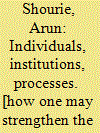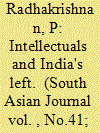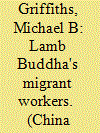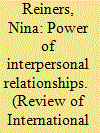| Srl | Item |
| 1 |
ID:
085170


|
|
|
|
|
| Publication |
New Delhi, Viking, 1990.
|
| Description |
x, 239p.pbk
|
| Standard Number |
0670837873
|
|
|
|
|
|
|
|
|
|
|
|
Copies: C:1/I:0,R:0,Q:0
Circulation
| Accession# | Call# | Current Location | Status | Policy | Location |
| 032708 | 320.954/SHO 032708 | Main | On Shelf | General | |
|
|
|
|
| 2 |
ID:
126084


|
|
|
| 3 |
ID:
097379


|
|
|
| 4 |
ID:
193479


|
|
|
|
|
| Summary/Abstract |
This article further develops and illustrates the argument that relationships between individuals help to explain the success of human rights advocacy in international institutions. Drawing from advocacy theory and socio-legal studies, I shift the attention from collective forms of advocacy to the importance of interpersonal relationships of advocates with individuals in international institutions to influence the development of human rights. I introduce a framework consisting of three analytical steps – mapping the key actors in a network, process-tracing, and biographical research – and apply the framework to three cases of norm development by a United Nations human rights treaty body. My findings highlight the power of interpersonal relationships for the making of human rights, and they inform scholarship on transnational elites, human rights advocacy, and the politics of international law.
|
|
|
|
|
|
|
|
|
|
|
|
|
|
|
|